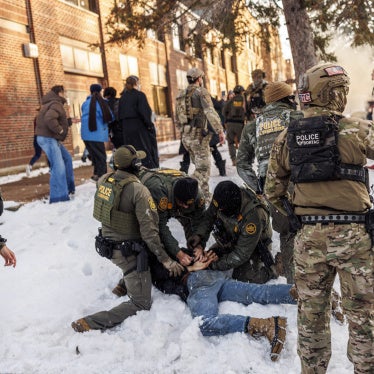In his willingness to confront evil head-on, President Bush likes to think he's more decisive than that mushy-headed multilateralist Bill Clinton. But when I look at the Bush administration's response to what it has itself called genocide in the Darfur region of Sudan, I can't help thinking I've seen this movie before. It recalls the early Clinton administration (in which I served) and its initially ineffectual stand against genocide in Bosnia.
In 1993 and 1994 the United States could point to dozens of good things it had done about Bosnia: imposing sanctions, brokering peace talks, supporting U.N. peacekeepers and providing humanitarian aid. But America's commitment to end genocide was hollow, because it was not, at that point, backed by political and military muscle. The same is true in Darfur today.
In 1993 the Clinton administration sent Secretary of State Warren Christopher to Europe to urge NATO to intervene against the Serb forces committing atrocities in Bosnia. America's European allies said no, and Christopher did not insist. Last month the Bush administration sent Deputy Secretary of State Robert Zoellick and Secretary of State Condoleezza Rice to Europe, where they raised the possibility of NATO help for a tiny African Union (A.U.) peacekeeping force deployed in Darfur. Without a larger and more capable force to protect civilians, the killing there will continue. But European countries were skeptical about a NATO role beyond, possibly, help with logistics. (France said that NATO should not be "the gendarme of the world.")
And if U.S. officials wanted more, they did not insist. After a key NATO meeting last week, all Rice had to say was: "The NATO Council today, as foreign ministers had lunch, discussed the situation in Sudan and in Darfur and what support NATO could give in the form of planning and logistics to support the A.U.-led effort, should a request be forthcoming or should it be necessary to help." Hardly a ringing call to action.
Before it took action in Bosnia, the Clinton administration hid behind the United Nations. Warren Christopher said in June 1994, "NATO has done [in Bosnia] whatever has been asked of it by the United Nations." The Bush administration is hiding behind the African Union, which has taken months to deploy just 2,000 troops in Darfur. Rice said last week: "We've been very active, but what we really all are focusing on now . . . is the African Union, which is taking the lead. . . . The African Union may need some help with capacity. If there is a request, I would hope that NATO would act favorably."
In the early 1990s the Pentagon resisted American involvement in Bosnia, seeing it as peripheral to U.S. interests. Today the Pentagon resists American involvement in Darfur, for the same reason. Nine slots in the African Union mission in Darfur are supposed to be filled by Americans. Of that tiny number, the Pentagon has filled at most three.
I have no doubt that the Bush administration cares about Sudan. The United States has done more than any other Western country for Darfur. To its credit, the administration even allowed the U.N. Security Council to refer the atrocities there to the International Criminal Court, despite its bitter opposition to this court.
The administration has been clear and correct about what should happen. The African Union should deploy additional forces. Sudan should cooperate with those forces, rein in its murderous militias and seek a diplomatic solution. But, as with Bosnia, no one wants to confront the obvious question: What if none of these things happen? What if the African Union, for reasons of regional pride or fear of confronting Sudan, never asks NATO for real help? What if Sudan concludes, as the Serbs did in Bosnia, that the way to ease international pressure is to complete its ethnic cleansing? Then Darfur will be free of violence (since the victims will be dead or concentrated in camps), and the international community might move on.
There is only one sure path to saving lives in Darfur: deploying a much larger military force with a clear mandate to protect civilians. The African Union should put in place a concrete plan to deploy more troops, at least 10,000, within a month. If the A.U. will not do that, the U.N. Security Council should immediately deploy a civilian protection force to do the job. And if the Security Council will not do that (because of, say, a Chinese veto), then NATO and the European Union should be prepared to step in. In any event, the United States and its allies should start planning now to provide logistical support and troops.
Persuading allies to back this approach will be hard. But for all of its good works on Darfur, the administration has not really tried. Since January Bush and Rice have met with leaders from NATO and U.N. Security Council member countries 29 times, and they have mentioned Darfur publicly only once. That's no way to convince the world -- and Sudan -- that America is serious.
When the Clinton administration finally made Bosnia a priority and began leading international institutions instead of hiding behind them, the killing there ended. It's not too late for the Bush administration to do the same for Darfur.






